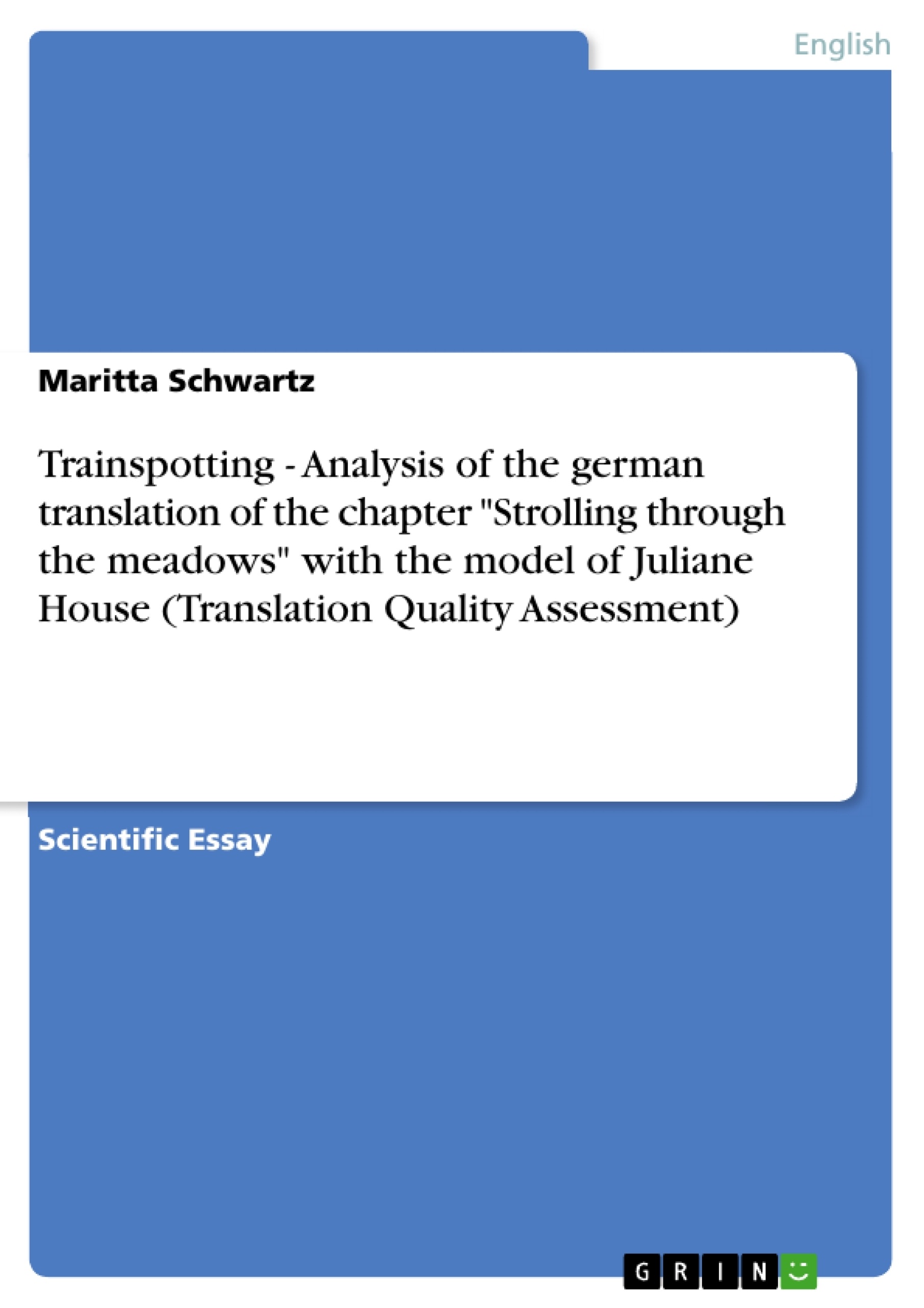Excerpt
Table of content
1. Analysis of the source text (ST)
1.1 Field
1.2 Tenor
1.2.1 Author’s temporal, social and geographical provenance
1.2.2 Author’s personal (emotional and intellectual) stance
1.2.3 Social role relationship
1.2.4 Social Attitude
1.3 Mode
1.3.1 Medium
1.3.2 Participation
1.4 Genre
2 Analysis and evaluation of the Target Text (TT)
2.1 Field
2.2 Tenor
2.2.1 Social role relationship
2.3 Mode
2.3.1 Medium
3. Evaluation of the TT
4. Bibliography
1. Analysis of the source text (ST)
1.1 Field
“Trainspotting” is the title of a novel, written by the contemporary Scottish author Irvine Welsh. The plot is set in contemporary Edinburgh, i.e. Leith, and deals with the lives and experiences of a group of heroin junkies. The chapter we are looking at deals with a nightly walk through the meadows that three of the characters set off to after a visit in a Pub. They are in search of two other mates of them. During their stroll they meet two girls they know and come across a squirrel which two of them attempt to hurt. The attempt is prevented by the third.
1.2 Tenor
1.2.1 Author’s temporal, social and geographical provenance
Irvine Welsh is a contemporary Scottish author. Trainspotting has been his most famous book so far and established him as an influential Scottish author, writing novels with a Scottish background, promoting “Scottishness”. The accuracy and detailed descriptions in the text let the reader assume what is known to be a fact, anyway, namely that Irvine Welsh himself has made his own experiences with taking drugs.
1.2.2 Author’s personal (emotional and intellectual) stance
Although a certain involvement in the Scottish drug scene is undeniable, he cannot be seen as a supporter of heroin addiction. Within the novel his position is marked by the end of the novel, when the protagonist leaves the drug scene of Edinburgh and sets off for a new life in another country and also by the communicative situation of the novel (loosely knit, short events in discontinuous order, told by changing 1st –person I-narrators) which will be analysed more closely in the chapter “participation”. The permanent change of narrators produces changing perspectives, which, again, create objectivity and distance (as no character is too clearly preferred) and intimacy at the same time, because we get to know the secret thoughts of the different narrators.
In the “outside world”, the author’s stance is clearly marked by his social position as a successful writer, which he would not be, if he led a life that was similar to that of his characters in the novel.
1.2.3 Social role relationship
Due to the communicative situation in the text the author is hardly present to the reader. Therefore the author – reader relationship can be seen as symmetrical. Moreover, the communicative situation as well as the use of regional accent, slang and swear words creates an atmosphere of intimacy. So the character – reader relationship can be described as symmetrical as well. Within the group of characters we find both symmetrical an asymmetrical relationships. Begbie is certainly some kind of boss within that group of pals. There are official authorities (judge, job centre), as well as authorities within the junkie microcosm (“Mother Superior”) that the main characters of the novel are subordinated to. But apart from Begbie they all seem to be on one level within their group.
Lexical / textual means
Usually the members of the group call themselves by their nicknames, sometimes in a very rude tone, insulting the other, swearing.
Sometimes these permanent role patterns (position roles) are replaced by “situational roles”. In the given chapter this change takes place when Renton starts calling Spud with his real name “Danny” which in this situation indicates his honest and serious attitude.
1.2.4 Social Attitude
The social attitude of the author towards the reader can be seen as very informal. As mentioned before, the author’s presence can hardly be felt in the novel.
[...]
- Quote paper
- Maritta Schwartz (Author), 1998, Trainspotting - Analysis of the german translation of the chapter "Strolling through the meadows" with the model of Juliane House (Translation Quality Assessment), Munich, GRIN Verlag, https://www.grin.com/document/5116
Publish now - it's free






















Comments